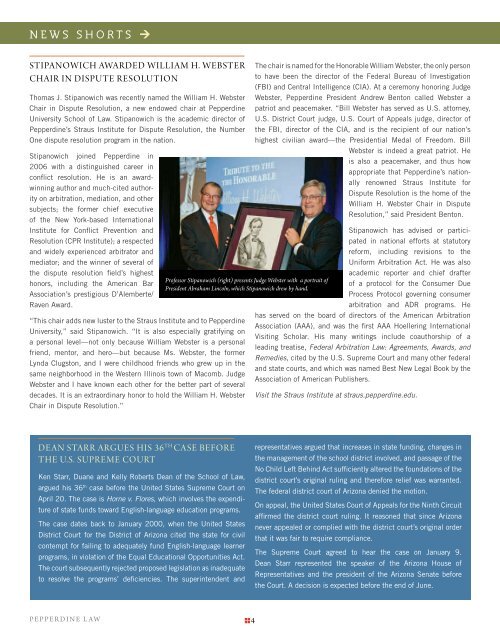Download - Pepperdine Law Magazine - Pepperdine University
Download - Pepperdine Law Magazine - Pepperdine University
Download - Pepperdine Law Magazine - Pepperdine University
Create successful ePaper yourself
Turn your PDF publications into a flip-book with our unique Google optimized e-Paper software.
n e w s s h o r t s Stipanowich Awarded William H. WebsterChair in Dispu te Resolu tionThomas J. Stipanowich was recently named the William H. WebsterChair in Dispute Resolution, a new endowed chair at <strong>Pepperdine</strong><strong>University</strong> School of <strong>Law</strong>. Stipanowich is the academic director of<strong>Pepperdine</strong>’s Straus Institute for Dispute Resolution, the numberone dispute resolution program in the nation.Stipanowich joined <strong>Pepperdine</strong> in2006 with a distinguished career inconflict resolution. He is an awardwinningauthor and much-cited authorityon arbitration, mediation, and othersubjects; the former chief executiveof the New York-based InternationalInstitute for Conflict Prevention andResolution (CPR Institute); a respectedand widely experienced arbitrator andmediator; and the winner of several ofthe dispute resolution field’s highesthonors, including the American BarAssociation’s prestigious D’Alemberte/Raven Award.Professor Stipanowich (right) presents Judge Webster with a portrait ofPresident Abraham Lincoln, which Stipanowich drew by hand.“This chair adds new luster to the Straus Institute and to <strong>Pepperdine</strong><strong>University</strong>,” said Stipanowich. “It is also especially gratifying ona personal level—not only because William Webster is a personalfriend, mentor, and hero—but because Ms. Webster, the formerLynda Clugston, and I were childhood friends who grew up in thesame neighborhood in the Western Illinois town of Macomb. JudgeWebster and I have known each other for the better part of severaldecades. It is an extraordinary honor to hold the William H. WebsterChair in Dispute Resolution.”The chair is named for the Honorable William Webster, the only personto have been the director of the Federal Bureau of Investigation(FBI) and Central Intelligence (CIA). At a ceremony honoring JudgeWebster, <strong>Pepperdine</strong> President Andrew Benton called Webster apatriot and peacemaker. “Bill Webster has served as U.S. attorney,U.S. District Court judge, U.S. Court of Appeals judge, director ofthe FBI, director of the CIA, and is the recipient of our nation’shighest civilian award—the Presidential Medal of Freedom. BillWebster is indeed a great patriot. Heis also a peacemaker, and thus howappropriate that <strong>Pepperdine</strong>’s nationallyrenowned Straus Institute forDispute Resolution is the home of theWilliam H. Webster Chair in DisputeResolution,” said President Benton.Stipanowich has advised or participatedin national efforts at statutoryreform, including revisions to theUniform Arbitration Act. He was alsoacademic reporter and chief drafterof a protocol for the Consumer DueProcess Protocol governing consumerarbitration and ADR programs. Hehas served on the board of directors of the American ArbitrationAssociation (AAA), and was the first AAA Hoellering InternationalVisiting Scholar. His many writings include coauthorship of aleading treatise, Federal Arbitration <strong>Law</strong>: Agreements, Awards, andRemedies, cited by the U.S. Supreme Court and many other federaland state courts, and which was named Best New Legal Book by theAssociation of American Publishers.Visit the Straus Institute at straus.pepperdine.edu.De an Starr Argues His 36 th Ca se Beforethe U.S. Supreme CourtKen Starr, Duane and Kelly Roberts Dean of the School of <strong>Law</strong>,argued his 36 th case before the United States Supreme Court onApril 20. The case is Horne v. Flores, which involves the expenditureof state funds toward English-language education programs.The case dates back to January 2000, when the United StatesDistrict Court for the District of Arizona cited the state for civilcontempt for failing to adequately fund English-language learnerprograms, in violation of the Equal Educational Opportunities Act.The court subsequently rejected proposed legislation as inadequateto resolve the programs’ deficiencies. The superintendent andrepresentatives argued that increases in state funding, changes inthe management of the school district involved, and passage of theNo Child Left Behind Act sufficiently altered the foundations of thedistrict court’s original ruling and therefore relief was warranted.The federal district court of Arizona denied the motion.On appeal, the United States Court of Appeals for the Ninth Circuitaffirmed the district court ruling. It reasoned that since Arizonanever appealed or complied with the district court’s original orderthat it was fair to require compliance.The Supreme Court agreed to hear the case on January 9.Dean Starr represented the speaker of the Arizona House ofRepresentatives and the president of the Arizona Senate beforethe Court. A decision is expected before the end of June.P E P P E R D I N E L AW 4


